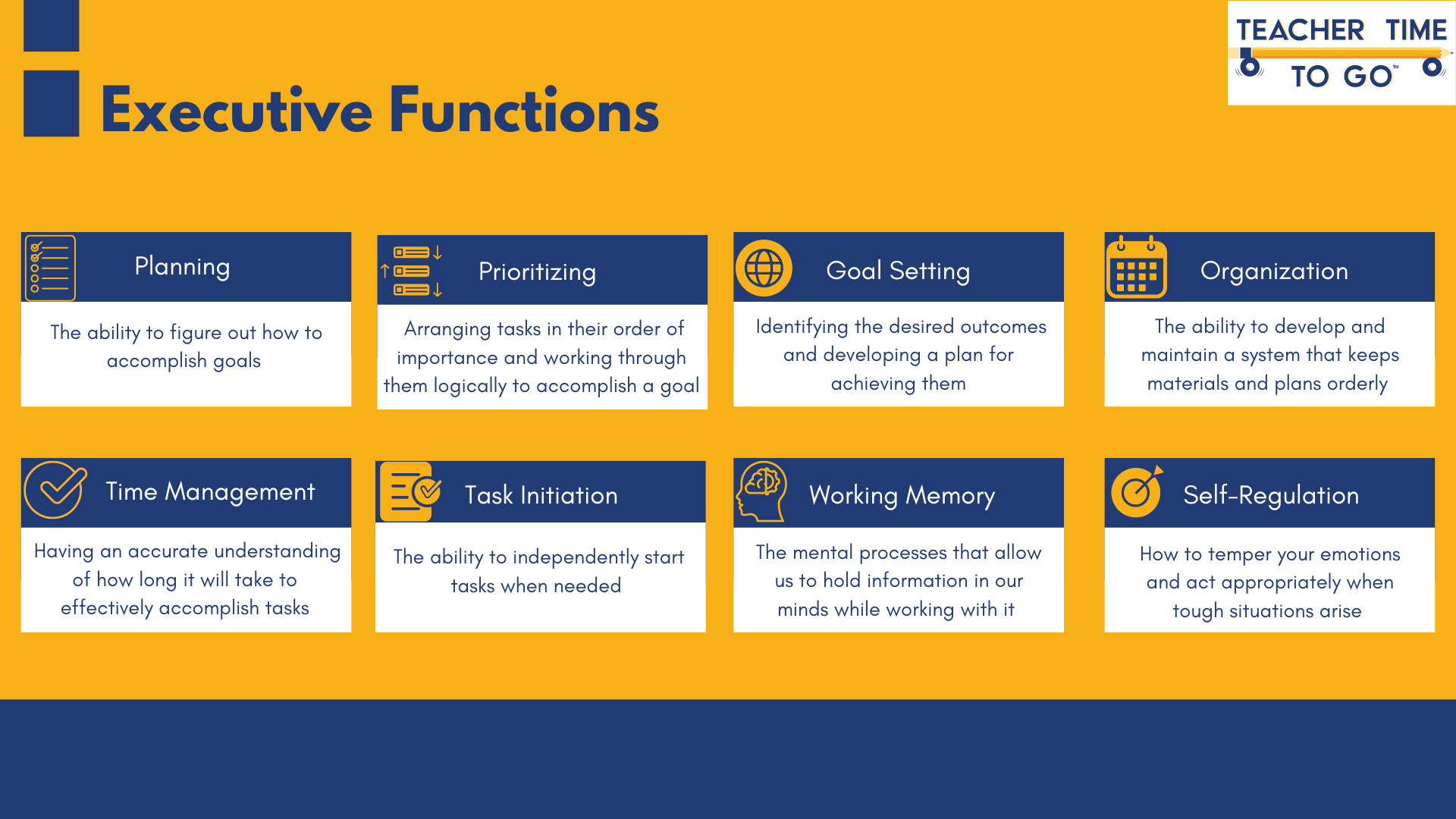Executive Functioning is best understood as the skills we use every day to learn, work and manage daily life. You can think of the term as the skills required to execute tasks.
This is the 5th post of an 8-part series highlighting Executive Functioning Skills. You will find definitions, parent recommendations and strategies that can be implemented for immediate support at home for families or in the classroom for teachers. My hope is that by helping you to understand what Executive Functioning is, you’ll be able to best support your child!
This post is all about Time Management. Time Management is a skill that helps us use our time effectively and accomplish tasks on time. When we have good time management skills, we can plan ahead, avoid procrastination, and meet deadlines with ease.
Tangible ways this can look like is using calendars, breaking tasks into smaller pieces, and setting reminders.
First and Foremost
Good time management offers several benefits, including:
- Increased Productivity: Effectively managing time helps you accomplish more in less time, leading to greater efficiency.
- Reduced Stress: With a clear plan and an organized schedule, you can avoid last-minute cramming and the anxiety that comes with it.
- Better Focus: Prioritizing tasks allows you to concentrate on what’s important, reducing distractions and improving the quality of your work.
- Enhanced Decision-Making: With more time to evaluate options and plan ahead, you can make better, more informed decisions.
- Improved Work-Life Balance: Effective time management allows you to allocate time for both studies and personal life, leading to a more balanced lifestyle.
- Greater Opportunities: Being organized and punctual can open doors to new opportunities, whether in academics or extracurricular activities.
- Skill Development: Practicing time management helps you develop essential skills like organization, planning, and self-discipline.
- Achieving Goals: By setting and managing your time around specific goals, you’re more likely to achieve them.
- Enhanced Self-Confidence: Successfully managing your time can boost your confidence and motivation, as you see tangible progress.
- Long-Term Success: Good time management habits cultivated in school can translate into professional success in the future.
Overall, effective time management is a crucial skill that contributes to academic success and personal well-being.

Execution
Time Management can look very different for different people. There are many ways to approach it and many tools that can be used for support.
Using a calendar is a great way to keep track of important dates and deadlines. You can use a physical calendar or a digital one on your phone or computer. Make sure to write down all of your important tasks, meetings, and events so you don’t forget them.
Sometimes tasks can seem overwhelming, especially if they are large or complex. Breaking them into smaller, more manageable pieces can help make them less intimidating. This is the concept of chunking. This way, you can focus on one piece at a time and feel more accomplished as you complete each step.
Setting reminders can be really helpful for remembering important tasks and deadlines. There are many wonderful apps that you can use to keep track of “to-do” lists. You can also set reminders on your phone or computer, or even use sticky notes around your workspace. This way, you can stay on top of your to-do list and avoid forgetting important things.

Resource Recommendation
For time management, I recommend a timer like the one shown below, that shows the minutes and the seconds. It is very simple to operate and has a start, stop and reset button that even the youngest kids can learn and use. This tool is great for time blocking and time tracking to allow for breaks in between. While very simple, this is a powerful tool! You can get this at a local store or on-line retailer.

Final Thoughts
The biggest takeaway for Time Management is to find what works for your child, model, discuss and repeat! Exposure and repetition are key!
Next up in the series, we will be discussing Task Management, including Task Initiation and Task Completion.
As a reminder, during this series we will go into detail about each of the Executive Functions along with a specific user friendly definition and support strategies. The chart below will guide the series!

Here at TT2G, we are working with about 500 families in the local community. Approximately 75% of our families request some sort of Executive Functioning Support. As you can see, this set of skills is a highly sought after service. Reach out to us if you feel that your child could use support in any of these areas. We have a variety of services that can best meet the needs of your student, from group workshops to individual assessment and support plans.
If you’d like to review the other posts in the series, you can find them here: Executive Functioning Overview, Prioritization, Goal Setting, and Organization.
Have a Time Management Strategy that works for you? We’d LOVE to hear from you!
Live.Laugh.Learn,
Jenn

